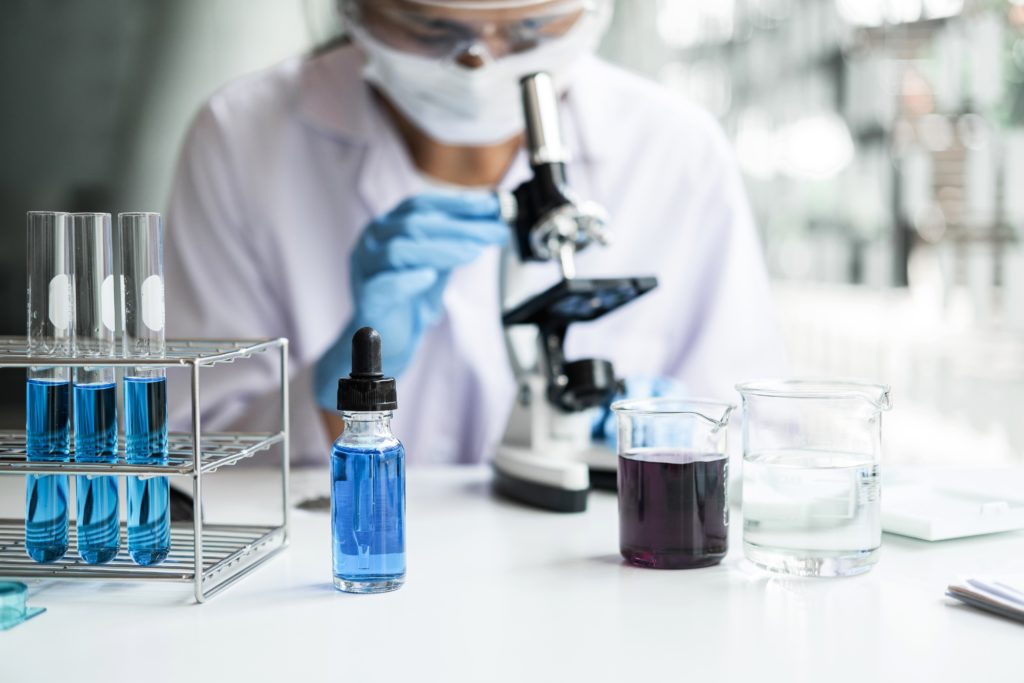Medical laboratory scientists, often referred to as medical technologists or clinical laboratory scientists, analyze a variety of biological specimens. More specifically, they perform scientific testing on samples and report results to physicians. Using sophisticated equipment like microscopes, medical laboratory scientists examine and analyze blood, body fluids, tissues and cells.
The results they find are crucial in identifying and treating various diseases, including cancer, diabetes, heart disease and other medical conditions. In fact, the results of tests performed by medical laboratory scientists are estimated to play a role in well over half of all decisions regarding a patient’s diagnosis, treatment, hospital admission and discharge.
In addition to obtaining a high school diploma, medical laboratory scientists tend to have a bachelor’s degree in medical technology, clinical laboratory science or other health-related fields, like chemistry or microbiology. As part of their education, they often complete a clinical laboratory program or internship through a hospital-based program. Previous experience in a healthcare setting can also set candidates apart.
Wondering which medical laboratory scientist job is right for you? Read on to learn about job titles within the space — such as medical laboratory technologists and medical laboratory managers — including job descriptions, average annual salaries and the level of experience required to land the role.
To start applying to medical laboratory scientist jobs now, check out the Xtalks Job Search to find a job that best suits you.
Medical Laboratory Scientist
Job Description
Being a medical laboratory scientist involves collaborating with physicians and other medical professionals in diagnosing and monitoring disease processes, as well as monitoring the effectiveness of treatments. Medical laboratory scientists have a wide variety of responsibilities and duties, including cross matching blood for transfusion, monitoring patient outcomes and establishing quality assurance programs to monitor and ensure the accuracy of test results.
Areas of medical laboratory training include microbiology, chemistry, hematology, immunology, transfusion medicine, toxicology and molecular diagnostics.
Medical laboratory scientists generally work in veterinary clinics, hospitals, public health or forensic laboratories, research institutions, as well as in the pharmaceutical and biotechnology industries. Typically, labs are run 24 hours a day, seven days a week, but work hours will vary depending on the setting.
How to Become a Medical Laboratory Scientist
The minimum education level required to become a medical laboratory scientist is a degree from a post-secondary institution in medical technology or medical laboratory science. Medical laboratory scientists may also have a bachelor’s degree in science or another health-related field. Employers tend to require certification with the American Society for Clinical Laboratory Science (ASCLS) or another national certification as a medical laboratory scientist.
A medical laboratory scientist typically has more education than a medical laboratory technologist or assistant and is able to perform more involved lab work. Since they work so closely with others, successful medical laboratory scientists are effective communicators with a keen interest in science and technology.
Excellent dexterity, eye-hand coordination and visual acuity are also important skills. Individuals interested in science and research who prefer to have minimal interaction with patients would be a good fit for the medical laboratory scientist career path.
Medical Laboratory Scientist Salary
The median salary for a US-based medical laboratory scientist is $54,000, though salaries can range between $31,000 to $83,000 depending on education, location and previous experience.
Medical Laboratory Technologist
Job Description
Being a medical laboratory technologist or technician means assisting in the diagnosis, treatment and prevention of diseases. Using a variety of instruments and equipment, they analyze tissue samples, blood and other body fluids as a part of the diagnostic procedure. Medical laboratory technologists provide the results of these tests to physicians, allowing them to make accurate diagnoses and, if needed, treatment plans.
Medical laboratory technologists can specialize in several areas, including clinical chemistry, microbiology, hematology, transfusion science and histology. They can work in a variety of settings, but they mainly work in labs in hospitals, blood banks, public and private clinics, research facilities and post-secondary institutions.
Medical laboratory technologists tend to perform more of the day-to-day lab work and are often supervised by a medical laboratory scientist.
How to Become a Medical Laboratory Technologist
To become a medical laboratory scientist one must obtain a diploma or university degree in medical laboratory science or have equivalent education, such as a bachelor of science in microbiology or a related biological science. Some employers also require certification with the ASCLS or another national certification as a medical laboratory scientist.
In addition to educational requirements, medical laboratory scientists must be detail oriented and able to follow strict procedures, work both independently and as part of a team and have strong interpersonal and communication skills.
Medical Laboratory Technologist Salary
The median salary for a US-based medical laboratory scientist is $53,120 per year, with the best-paid 25 percent making $68,100 per year, and the lowest-paid 25 percent making $39,030.
Medical Laboratory Assistant
Job Description
Medical laboratory assistants are responsible for a wide variety of tasks, including phlebotomy, also known as blood collection. Additionally, medical laboratory assistants can perform electrocardiograms (ECGs), collect other samples, prepare specimens for testing and data entry, among other procedures.
As a subgroup of medical laboratory technologists, medical laboratory assistants typically work under the supervision of medical laboratory scientists, assisting them and staff in coordinating patient care through laboratory testing. Medical laboratory assistants can work in all departments of the lab and ensure that the daily activities and the validity of test results and quality control are completed.
Medical laboratory assistants tend to work in lab environments and can expect to be on their feet for extended periods of time standing, operate sophisticated laboratory equipment and may be required to work evenings, weekends or overnight.
How to Become a Medical Laboratory Assistant
Medical laboratory assistants are typically only required to obtain a minimum of a high school diploma or GED. However, an associate’s or bachelor’s degree in a scientific field, like chemistry, biology or biotechnology, can set you apart.
Depending on the position and its scope, some employers may allow candidates to substitute work experience for formal education or a certificate. Although medical laboratory assistants are not normally required to obtain certifications, they can demonstrate a candidate’s willingness to grow, learn and advance in the industry. An example is the Certified Medical Laboratory Assistant (CMLA) certificate offered by the American Medical Technologists.
In addition to educational requirements, medical laboratory assistants should have stronger interpersonal and communication skills, strong attention to detail, time management and analytical skills.
Medical Laboratory Assistant Salary
Salaries for US-based medical laboratory assistants vary according to experience level and location, but the average hourly salary is $16.96. However, some salaries range from $7.25 to $30.85 per hour.
Medical Laboratory Manager
Job Description
A medical laboratory manager, often referred to as a medical laboratory lead or head, is mainly responsible for supervising the work of medical laboratory scientists and medical laboratory technologists, overseeing budgetary and administrative responsibilities and developing lab safety policies that align with international accreditation standards.
Since safety is paramount in a lab environment, medical laboratory managers must also oversee the functionality of laboratory equipment, train medical laboratory scientists and medical laboratory technologists on how to use the equipment properly and report the conditions of a clinical laboratory regularly to a supervisor or accreditation board.
Medical laboratory managers are employed in a wide variety of healthcare environments, including medical and surgical hospitals, diagnostic laboratories, offices of physicians, post-secondary institutions, and outpatient care centers.
Day-to-day tasks will vary, but medical laboratory managers typically oversee the daily operations of a lab, communicate with supervisory medical directors, coordinate test procedures between different scientists, resolve technical problems and ensure patient data is accurate and secure, among other tasks.
How to Become a Medical Laboratory Manager
Due to the varied nature of medical laboratory managers’ responsibilities, employers may require candidates to have advanced degrees in healthcare administration or a science-related field to prepare them for management responsibilities. A minimum of five years of clinical laboratory science experience is generally required in order to meet minimum job qualifications.
Medical laboratory managers are often promoted from the ranks of the technical staff, so long as they have the appropriate skillset. Management skills are essential for medical laboratory science professionals, whether they choose to advance their careers into leadership or organize projects.
Certification requirements vary by state, but many can be found at the ASCLS.
Medical Laboratory Manager Salary
The average medical laboratory manager salary in the US is $108,000 per year, but the range typically falls between $95,700 and $120,000.
The demand for medical laboratory scientists continues to grow, especially as the COVID-19 pandemic lingers on. The job outlook of the field is promising, as the Bureau of Labor Statistics estimates an 11 percent growth rate from 2018 to 2028 for medical laboratory scientists and medical laboratory technologists — more than twice the average growth rate for all occupations.
With this in mind, now is a great time to start your career or find your next medical laboratory scientist job by exploring current openings on Xtalks Job Search.











Join or login to leave a comment
JOIN LOGIN